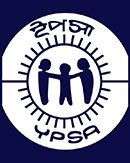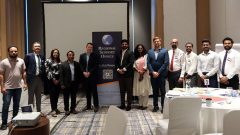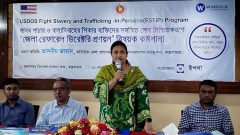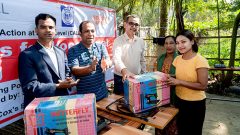YPSA organized a training titled, “Training on Counter Trafficking Issues, Smuggling and Human Trafficking Act 2012” at the Ghonarpara APBn Camp, Ukhiya, Cox’s Bazar on 23rd January, 2024. The training was participated by the personnel of the Armed Police Battalion (APBn) working to maintain law and order situation and combat human trafficking in different Rohingya camps under Ukhiya sub district of Cox’s Bazar.
The training was organized under the project titled, “Prevention and Response Activities Implementation on Counter Trafficking Issues” being implemented by YPSA with support from International Organization for Migration (IOM). In the training, Mr. A.H.M. Kamrul Islam, Additional SP, Police Bureau of Investigation, 8 APBn was present as Special Guest while Mr. Jishu Barua, Program Manager and Counter Trafficking Focal of YPSA presided over. Mr. Md. Salauddin Kader, Assistant SP was present in the training as well.
Notably, the government of Bangladesh made the Prevention and Suppression of Human Trafficking Act in 2012 in an effort to prevent human trafficking and ensure reintegration of the victims of trafficking in the country. It is necessary to orient the Act on Human Trafficking (HT) to the relevant stakeholders as well as duty bearers for the full and effective application of the HT Act to help the trafficked victims get justice. According to the Act, any incidents of human activity taking place within the territory of the counter will be tried under the provisions of the ACT.
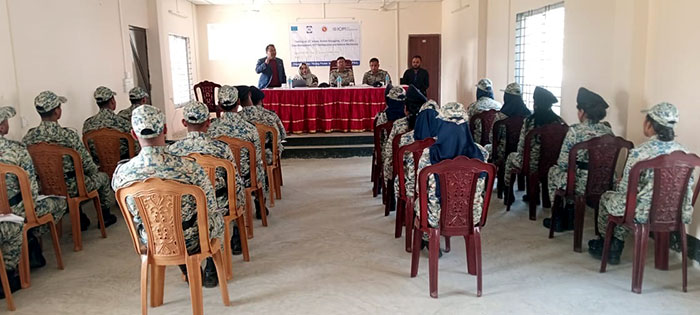
On behalf of YPSA management, Mr. Jishu Barua, Program Manager and Counter Trafficking Focal greeted the guests and participants of the training. In his greeting speech, he shared an overview of YPSA, objective and significance of the training as well. In addition, he underscored the significance of strong evidence collection against perpetrators to ensure justice of the trafficking victims because the court delivers verdict based on the evidence. Furthermore, he shared the challenges of reintegration and legal fight against human trafficking issues in Bangladesh, especially in the Camps in Cox’s Bazar. He added that in the camp context, people usually mix up human trafficking incidents with that of human smuggling incidents which should be separated in order to ensure justice under the specific provisions of the legal framework. After attending the training, the participants will be able to differentiate between human trafficking and human smuggling incidents.
In his greeting speech, Mr. A.H.M. Kamrul Islam, Additional SP, Police Bureau of Investigation, Ukhiya Upazila said, “We have currently observed a sharp increase of trafficking incidents in the camps. We earnestly appreciate YPSA for organizing the training on the Human Trafficking Act 2012. It is really important for the personnel of APBn to know about the Human Trafficking 2012 to combat human trafficking and ensure justice of the trafficked victims in the Rohingya Camps.” He added, “Most of the participants in the training are newly deployed. I believe that this training is timely organized and they will highly benefit from attending the training session.”

YPSA has been working on Counter Trafficking issues in the sub-district for a long time. After 2018, incidents of human trafficking started to increase. As per the decision of the Counter Trafficking Committee (CTC) and Camp Administration of Ukhiya sub-district, YPSA has been creating awareness on anti-human trafficking issues at the community level and capacity building of the different duty bearers. As a part of it, YPSA has organized the training for the Armed Police Battalion (APBN) so that human trafficking can be prevented through a collaboration of the law enforcement agencies, local administration and community people.
Mr. Suvra Adhikari, Project Officer of YPSA presented the overview of the Counter Trafficking Project being implemented by YPSA with support from IOM. He also conducted a session on the difference between Human Trafficking and Human Smuggling.
However, the objectives of the training are to orient the human trafficking Act 2012, how to investigate any cases of human trafficking efficiently, how to ensure protection of a victim under the Act, how to help the trafficked victims get justice through collecting relevant information, documents and elements of the cases.
It is worth mentioning that the government of Bangladesh made the, “Prevention and Suppression of Human Trafficking Act 2012” to combat human trafficking in the country. In 2017, the government passed the Rules of the Act as well. In order to orient the act among more people and agencies, YPSA alongside the Bangladesh Government has been working over the years. As a part of the initiative, YPSA organizes the training to provide technical support to the agencies for their capacity development to counter trafficking in light of the HT Act 2012 of Bangladesh.
Advocate Ms. Saki A-Kawser, Special Public Prosecutor, Nari-O-Shishu Nirjaton Daman Ain Tribunal Cox’s Bazar was the key facilitator who facilitated sessions on the Act of 2012 and the Rules of 2017 on a practical ground. She detailed out the significant parts of the Act which are crucial to know for the personnel of Law Enforcement Agencies to support the trafficking victims to get justice. The discussion points included definition of human trafficking as per Act 2012, how an investigation officer can prepare help himself to find out the true elements of the case, how to prepare an investigation report, how to establish authenticity of the report, witness of the case, protection of victims as well as of witness, punishment of perpetrators under the ACT etc.
One of the participants Mr. Sariful Islam, ASI, 8 APBn, Camp#12 Said, “Camp-life is not a happy life for the Rohingyas indeed. They face different problems like unemployment, dowry in the camps so they want to get rid of all these problems. But, in the camp context, there are very limited facilities so they are vulnerable in the camps. Traffickers capitalize vulnerabilities of these people and eventually exploit them. The trafficking effected Rohingyas do not know about how to address the issues. We can work on the issues. As we have learned about the human trafficking Act-2012, we can create the vulnerable community people aware about the trafficking and at the same time, we can nab the traffickers in light of the HT Act-2012 and ensure justice to the trafficked victims in the camps.”
Another participant Ms. Megla Barua, Constable, APBn, “I did not know that there was such a law on anti-human trafficking before. I have learned about it. Now, I can work on counter trafficking issues in the Rohingya camps in light of the Anti-Human Trafficking 2012.”
The training ended with an open discussion in which participants asked some significant questions. The facilitators entertained those questions accordingly.
Panel of Facilitators of the Training:
- Advocate Ms. Saki A-Kawser, Special Public Prosecutor, Nari-O-Shishu Nirjaton Daman Ain Tribunal, Cox’s Bazar
- Jishu Barua, Program Manager and Counter Trafficking Focal, YPSA
- Suvra Adhikari, Project Officer, YPSA
